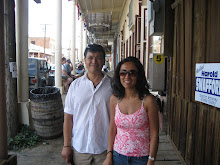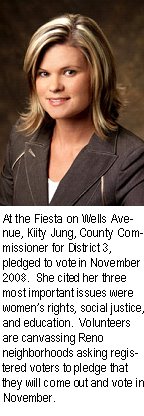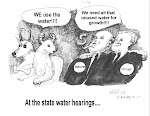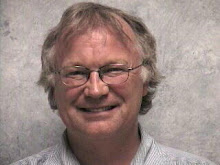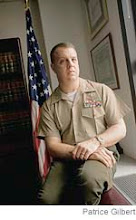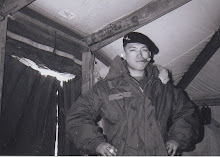
My name is Joaquin Rafael Roces. I have lived in Nevada since 1979. I grew up in Reno, and I was part of the third graduating class of McQueen High School in 1985. I have worked and lived in Fernley and Fallon. Among other things, I was a rodeo cowboy, a bull rider, Nevada is home to me. I want to preface what I am about to say with the comment, that I did not serve in a war like Al Gore, nor was I awarded the Purple Heart as was John Kerry. I was never a prisoner of war, and I am certainly no son of a President. I want to make it clear to everyone here, I am no hero. What I am is a Marine, I served as a rifleman with Kilo Company, 3rd Battalion, 2nd Marines, 2nd Mar Div, FMFlant. In 1987, during training and security operations in the Republic of the Philippines, during an armed coup against the then President Acquino, I was wounded in the line of duty and medically retired. I am a registered Republican, a naturalized US Citizen, and a disabled veteran. I served in two commissions under Governor Guinn and voted for Gov. Gibbons, and supported both through most of their political careers. I am no hero. I am a single working father, a first generation immigrant, trying to provide a better life for my sons, who, God willing, I will have the fortune of seeing grow into honorable manhood.
So forgive me, if I should seem a little uncomfortable with these proceedings as I am not a very good public speaker, and this is certainly way out of my comfort zone. However, I learned in the Marine Corps that comfort is an illusion born of familiar things and familiar ways; a tissue thin lie; a false sense of security that in of itself breeds mediocrity and complacency. It narrows the mind; weakens the body; and robs the soul of its spirit and determination. Comfort, the Marine Corps has taught me, is an illusion. Robert Kennedy once said it is not just bravery under fire or the bravery to make sacrifices, but the bravery to discard the comfort of illusion, to do away with false hopes and alluring promises. Reality is grim and painful, but it is only a remote echo of the anguish that a policy and agenda founded on illusion is sure to take us. The Bush doctrine, developed under the National Security Strategy (issued in 2002), advocates for the pre-emptive use of military power for self-defense and national security, if it is intended to assert a right available to the United States alone, is a policy founded on illusion. If it is intended to assert a new legal principle of general application, its implications, according to Richard Gardner, former Deputy Assistant Secretary of State, are so ominous as to justify universal condemnation. For such a doctrine would legitimize preemptive attack by Arab Countries against Israel, by China against Taiwan, by India against Pakistan, and by North Korea against South Korea, just to cite some obvious examples from Mr. Gardner. It would even serve to legitimize ex post facto use of such power as Japan’s attack on Pearl Harbor. Already, its application has rippled out from its epicenter at the Oval Office: Israel’s strike against Hizzbolah in Lebanon and Ethiopia’s Pre-emptive strike on Somali rebel forces- both occurred in 2006. Ethiopia's prime minister, Meles Zenawi, said Ethiopia entered hostilities because it faced a potential threat to its own borders. “Ethiopian defense forces were forced to enter into war to protect the sovereignty of the nation,” he said. “We are not trying to set up a government for Somalia, nor do we have an intention to meddle in Somalia's internal affairs. We have only been forced by the circumstances.”
Henry Kissinger, who is certainly not known for his dedication to International law, put the matter succinctly in a column for the Washington Post:
“As the most powerful nations in the world, the United States has a special unilateral capacity to implement its own convictions. But it also has a special obligation to justify its actions by principles that transcend the assertions of a preponderant power. It can not be in either the American national interest or the world’s interest to develop principles that grant every nation an unfettered right to pre-emption against its own definition of threats to its security.”
Those principles are embodied within the framework of our Constitution. (Korematsu v. United States- 1994), Justice Robert Jackson warned that a military order, however unconstitutional, is not apt to last longer than the military emergency. Justice Jackson adds, but once a judicial opinion rationalizes such an order to show that it conforms to the constitution, or rather rationalizes the Constitution to show that the Constitution sanctions such an order, the court for all time has validated that principle. Thus that principle then lies about like a loaded weapon ready for the hand of any authority that can bring forward a plausible claim of an urgent need. Voltaire put it simply, “Those who can make you believe absurdities can make you commit atrocities.” From the illusion of weapons of mass destruction and imminent harm from Saddam Hussien and Iraq, we have the dismantling of our civil rights under the Patriot Act, the national shame at Abu Ghirad and Guantanomo, the death of 3700 Americans, approximately 40 from this state alone, and an endless conflict that has already outstretched both World War I and II as well as the Korean War from 1951-1953.
Beyond the human cost, the financial and economic repercussions of “staying the course” at $9 billion per month, on top of an initial outlay of up to $13 billion for the deployment of troops to the Persian Gulf region will not be felt for years to come. According to the nonpartisan Congressional Budget Office (CBO), they estimated the cost of "prosecuting" a war against Iraq at up to $9 billion per month, on top of an initial outlay of up to $13 billion for the deployment of troops to the Persian Gulf region.
Summary of Iraq War Cost Estimates
CBO estimated the following costs for an Iraq war:
- Initial deployment of troops: $9 billion to $13 billion
- Conducting the war: $6 billion to $9 billion per month
- Returning forces to US: $5 billion to $7 billion
- Temporary occupation of Iraq: $1 billion to $4 billion per month
In comparison, from 1941 until 1945, during the Second World War, President Roosevelt paid for war effort by selling Bonds to the US public. The US had 7 bond drives to raise funds to support the war effort. By the 7th Bond drive, shortly after the battle for Iwo Jima, the US government was literally broke. The 7th Bond Tour raised $24 Billion (1945 Dollars) for the US Treasury, more than any other bond tour. To put this into perspective, the total US Budget in 1946 was $56 Billion. This would be the largest borrowing from the American public in history. Today the President can just spend our money on war without consulting us, the taxpayers. As of today according to the National Priorities Project the cost of the war in Iraq is $455,937, 345,134 and Nevada’s share of that is $4,084,357,618.
The debate about Iraq in Washington also centers around an illusion of a false choice: Do we continue with President Bush's failing course and hand the problem off to the next President? Or do we just turn our backs and hope for the best? Like Somalia? Like Rawanda? Like Darfur?
In 1975, the US signed a Peace treaty in Paris and made a commitment to its South Vietnamese allies that the US would intervene if the North invaded South Vietnam. When President Nixon was impeached, the North saw their opportunity and invaded South Vietnam, America ignored its treaty obligations and thousands were slaughtered and buried in mass graves, while thousands more fled the country in make-shift boats.
There is a third way. Leslie Gelb, President Emeritus of the Council on Foreign Relations, has proposed a five-point plan to keep Iraq together, protect America's interests and bring our troops home. I recognize that while leaving Iraq is necessary, it is not a plan in of itself. The vague campaign promise “That if elected president, I will end the war in Iraq” is nothing more than a bright and shining lie. President Eisenhower sent 14,000 Marines and Soldiers to Lebanon in 1958, President Reagan sent 1800 Marines in 1982-1984, and in 2006, our band-aid –on-a-sucking-chest-wound approach to the Middle East ruptured again. We need a plan for what we leave behind, so that America's interests and security are protected, and future generations need not put their lives at risk for what we left undone.
In 1975, civil war and sectarian violence erupted in Lebanon and after 7 years of bloodshed, US Marines along with French Legionnaires and Italian and British soldiers entered the conflict as part of a peacekeeping effort. Phillip Habib, Special Envoy to the Middle East was shuttled along the warring parties on Marine Corps and Navy transports – this would give birth to the term “Shuttle Diplomacy.” The Marines and their counterparts were used to buffer the warring parties until a diplomatic solution could be reached. The tragic events of October 2003, led to the deaths of 241 Marines and soldiers, and by the spring of 1984, America was withdrawing its forces from the conflict. War and sectarian violence would continue. Israel would not withdraw its troops until 2000 and Syria’s military would not follow until 2005. Lebanon still bears deep scars from the civil war. In all, it is estimated that more than 120,000 people were killed, and another 100,000 handicapped by injuries. Approximately 900,000 people, representing one-fifth of the pre-war population, were displaced from their homes. Perhaps a quarter of a million emigrated permanently. Lebanese victims of kidnapping and wartime "disappearances" number in the tens of thousands - over 17,000 civilians, are still missing. Unresolved ethnic tensions that were left behind and ignored in 1983, resurfaced last summer with a new Israeli offensive and renewed ethnic fighting that continues today.
Sectarian violence among Shiites, Sunnis and Kurds is now the major impediment to stability and progress in Iraq. Like Lebanon, no number of troops can solve that problem. The only way to hold Iraq together and create the conditions for our armed forces to responsibly withdraw is to give Shiites, Sunnis and Kurds a way to share power peacefully. That requires a sustainable political settlement, which is the primary objective of the plan.
The plan would maintain a unified Iraq by decentralizing it and giving Kurds, Shiites and Sunnis local control over their daily lives - as provided for in the Iraqi constitution. The central government would be responsible for common interests, like border security and the distribution of oil revenues. We would secure support from the Sunnis - who have no oil -- by guaranteeing them a proportionate share (about 20 percent) of oil revenues and reintegrating them into society. We would increase economic aid, ask the oil-rich Arab Gulf states to fund it and tie all assistance to the protection of minority rights and the creation of a jobs program. We would initiate a major diplomatic offensive to enlist the support of Iraq's neighbors and create an Oversight Group of the U.N. and the major powers to enforce their commitments. And we would ask our military to draw up plans to responsibly withdraw most U.S. forces from Iraq by the summer of 2008 - enough time for the political settlement to take hold - while leaving a small force behind to take on terrorists and train Iraqis. Keep in mind the US began withdrawing its 1800 troops in the spring of 1984 and it took almost a year to fully withdraw disengage all personnel. During the Gulf War in 1991, U.S. troop strength in the Middle East were reduced by 45 percent to 300,000, down from the peak of 540,000 between the war's end on Feb. 28 and Apr. 14. About 5,000 troops were leaving every day after that. At that rate, evacuating the remaining 300,000 would have taken another 60 days. But sectarian fighting in the north and south complicated the withdrawal and disengagement as residual forces remained to oversee no-fly and no-drive zones. We have over 105,000 troops with supporting infrastructure in Iraq today. We continue to have a military presence in Bosnia a decade after the end of hostilities.
There is no purely military solution to the sectarian civil war. The only way to break the vicious cycle of violence – and to create the conditions for our armed forces to responsibly withdraw -- is to give Shiites, Sunnis and Kurds incentives to pursue their interests peacefully. That requires an equitable and viable power sharing arrangement. That’s where this plan comes in. This plan is not partition – in fact, it may be the only way to prevent violent partition and preserve a unified Iraq. This plan is consistent with Iraq's constitution, which provides for Iraq's 18 provinces to join together in regions, with their own security forces, and control over most day-to-day issues. This plan is the only idea on the table for dealing with the militia, which are likely to retreat to their respective regions. This plan is consistent with a strong central government, with clearly defined responsibilities. Indeed, it provides an agenda for that government, whose mere existence will not end sectarian violence.
The example of Bosnia is illustrative. Ten years ago, Bosnia was being torn apart by ethnic cleansing. The United States stepped in decisively with the Dayton Accords to keep the country whole by, paradoxically, dividing it into ethnic federations. We even allowed Muslims, Croats and Serbs to retain separate security forces. With the help of U.S. troops and others, Bosnians have lived a decade in peace. Now, they are strengthening their central government, and disbanding their separate security forces.
President Bush does not have a strategy for victory in Iraq. His strategy is to prevent defeat and to hand the problem off to his successor. As a result, more and more Americans understandably want a rapid withdrawal, even at the risk of trading a dictator for chaos and a civil war that could become a regional war. Both are bad alternatives.
At the start of my speech, I used a quote from Robert Kennedy who said it is not just bravery under fire or the bravery to make sacrifices, but the bravery to discard the comfort of illusion, to do away with false hopes and alluring promises. I believe this is a great nation and a great people. Any who seek to comfort rather than speak plainly, reassure rather than instruct, promise satisfaction rather than reveal frustration; they deny that greatness and drain that strength. In closing, I think it an appropriate reminder that our freedom is not assured by the brilliance of our weapons, the greatness of our army, or the rhetoric of our noble leaders; it assured by the Constitution and the core principles embodied within. As a Marine Rifleman that is what I was sworn to defend above all else, against all enemies foreign and domestic. It is not about the Republican answer or the Democratic answer, but the right answer. The test of this new presidency is not about who is to blame for the past; but who will accept responsibility for our future.
Today, democrats, republicans and independents have come together to urge Dean Heller to change his position on the Iraq War. I was disheartened to learn that the White House and not General Petraeus, will give the the "Progress" report on Iraq next month. After more than four years of war, I no longer trust this administration and its false illusions and bright and shining lies. But most disheartening is Dean Heller's refusal to attend this town hall meeting and explain to us face to face why he continues to block an end to the war.





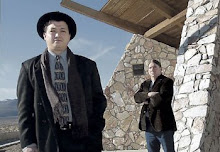



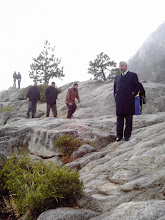+of+2-27-2007-040.jpg)


